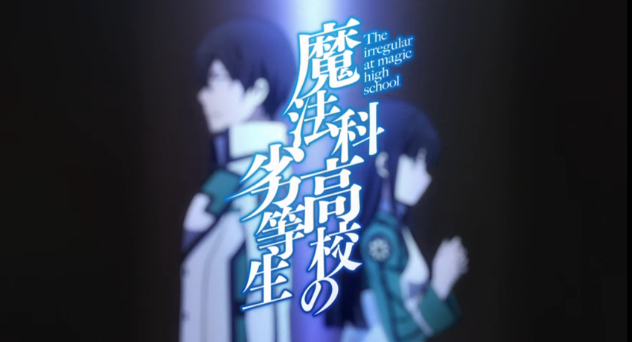
Studio: Madhouse
Release Date: April 5th, 2014
Episode Numbers: 15 & ongoing for 6 more arcs
Distributors: Crunchyroll, Aniplex
Genre(s): Fantasy
Rating: ★★★½☆☆
Review Spoilers: Mild
| Crunchyroll |
Warning note: The anime also contains two scenes with gore, which surprised me because they practically came out of nowhere.
Mahouka Koukou no Rettousei is an anime about magic in a modern era, following Tatsuya and Miyuki Shiba, a brother-sister pair. It fuses fantasy, class warfare, terrorism, school life, and sibling sexual tension into one series with varying degrees of success. It is localized as The Irregular at Magic High School, but it’s interesting to note that rettousei literally means poor student, another hint at the central divide present in the series, and the mystery behind Tatsuya, the primary protagonist. The anime is based on an ongoing (and best selling) light novel series that has also been adapted into manga. It began streaming in the spring on Crunchyroll and is now a very popular part of their lineup. For its popularity alone it was worth taking a look at, and I will say I was pleasantly surprised at some of the ways it takes on the notoriously silly shonen genre. I will be referring to it as Mahouka throughout this review.

The backdrop of this alternate universe begins with the advancement of technology to levels that make magic possible, but only gifted individuals can use it. The world is currently engaged in a cold wars-esque magic arms race. Japan is a player in the game, and magic high schools are their way of making it happen. Unsurprisingly, the situation in these schools is a slightly skewed version of Japanese reality. Tatsuya managed to get into the most elite magic school, but only managed to get into “course 2”, which is perceived as a place for untalented rejects by the more magical “course 1” students. This is further complicated by the fact that his sister is the top student of course 1 and an extremely talented magician. The issue here lies with standardized testing: only very specific types of knowledge and skills are quantifiable, and everything that is not is deemed as being less worthy. Tatsuya is an engineering prodigy, but his weakness in a single area brands him as inferior. Tatsuya constantly has to prove himself to everyone around him without taking credit for his work, but Miyuki is automatically a princess because her skills are more easily seen. Almost everyone can relate to this, and that is what makes the series hit so close to home even on the first episode.
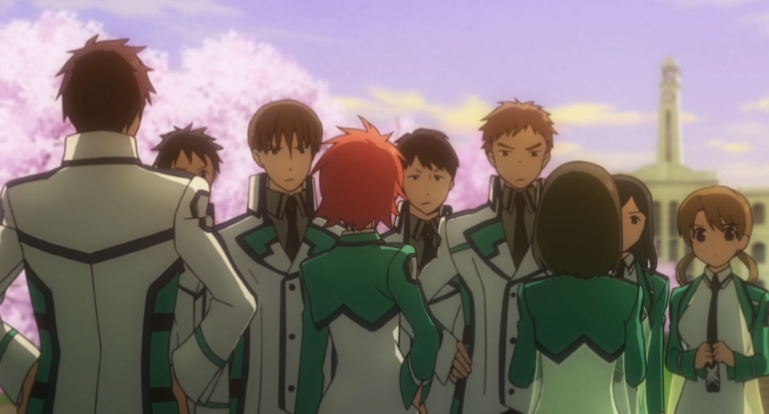
The central theme of Mahouka is the base inequality present at all levels of society. From the very top there are ten families that seem to run Japan behind the scenes, wielding exorbitant amounts of military clout and influence. You can immediately identify a person’s social standing because clan members share a last name. This leads to obvious favouritism and also clear discrimination- not only is Tatsuya a “weed” student, he is also a Shiba, an unknown, and not even respected by his own family members barring his sister. This class system goes all the way down and creates an obvious power divide between magic users and the common man. Tatsuya actually directly addresses the idea of equality early on the series, and his views may be surprising seeing as he is someone being discriminated against, but they are level headed at the same time. This entire social commentary is very relevant in the age of capitalism and the 1%, and to its credit Mahouka does not give the viewer any easy answers. Oh, except one: terrorism is never the answer.

I find that aspect of Mahouka to be the most interesting, but as the anime is only fifteen episodes in it hasn’t delved very deep into the subject. Some of the arguments it provides can definitely be thought-provoking if explored further. Another thing I enjoyed was the series’ mathematical approach to magic when most series take it at face value. Magic in this world is a subsect of engineering, and it shows in the brain-stroking discussions about it in the show. I’ll be honest here, I didn’t know what they were talking about half the time, but it was nice to see an author put work into the application of his systems. It becomes apparent that the strongest magic is the result of a powerful caster and a brilliant engineer- but the caster is the one who often gets all the credit while the engineer fades into the background. More social commentary, guys!
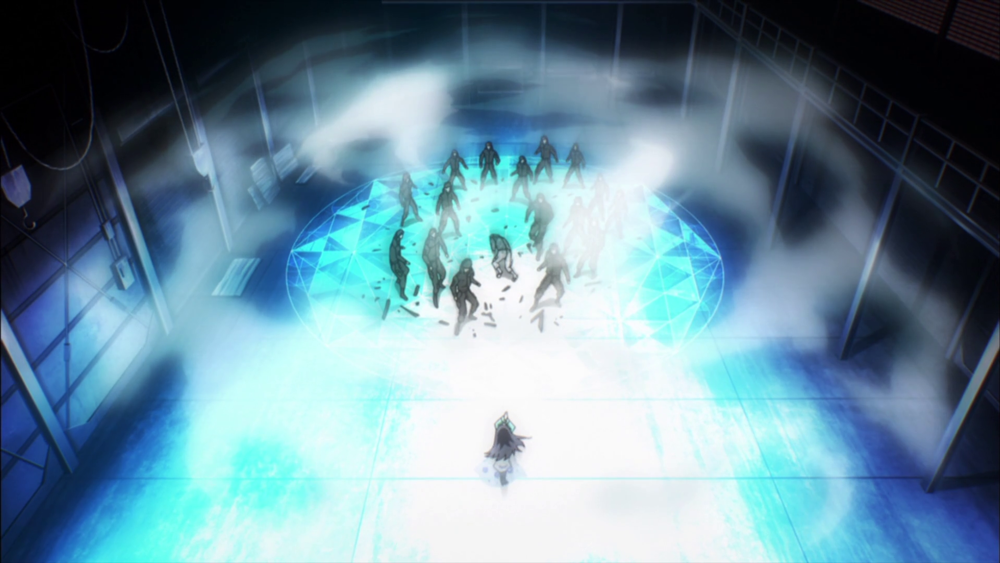
The last strong point of Mahouka is the art direction. The colour palettes and effects used for magic are fantastic, and fit very well into this modern fantasy world. It helps that the series is unified under the blue hues, which is used in a lot of magic spells and prevails throughout the series. The design in the backdrops is great, never feeling too “sci-fi” or out of place, just like an upgraded metropolis. Animation is smooth and the character designs are very eye catching, all good things for an anime. It feels high budget. There is not an excess of fighting, but battle scenes are similarly well done and easy to follow. It helps that they’re usually all resolved swiftly with fancy magic techniques. I can’t wait to see a drawn out battle.
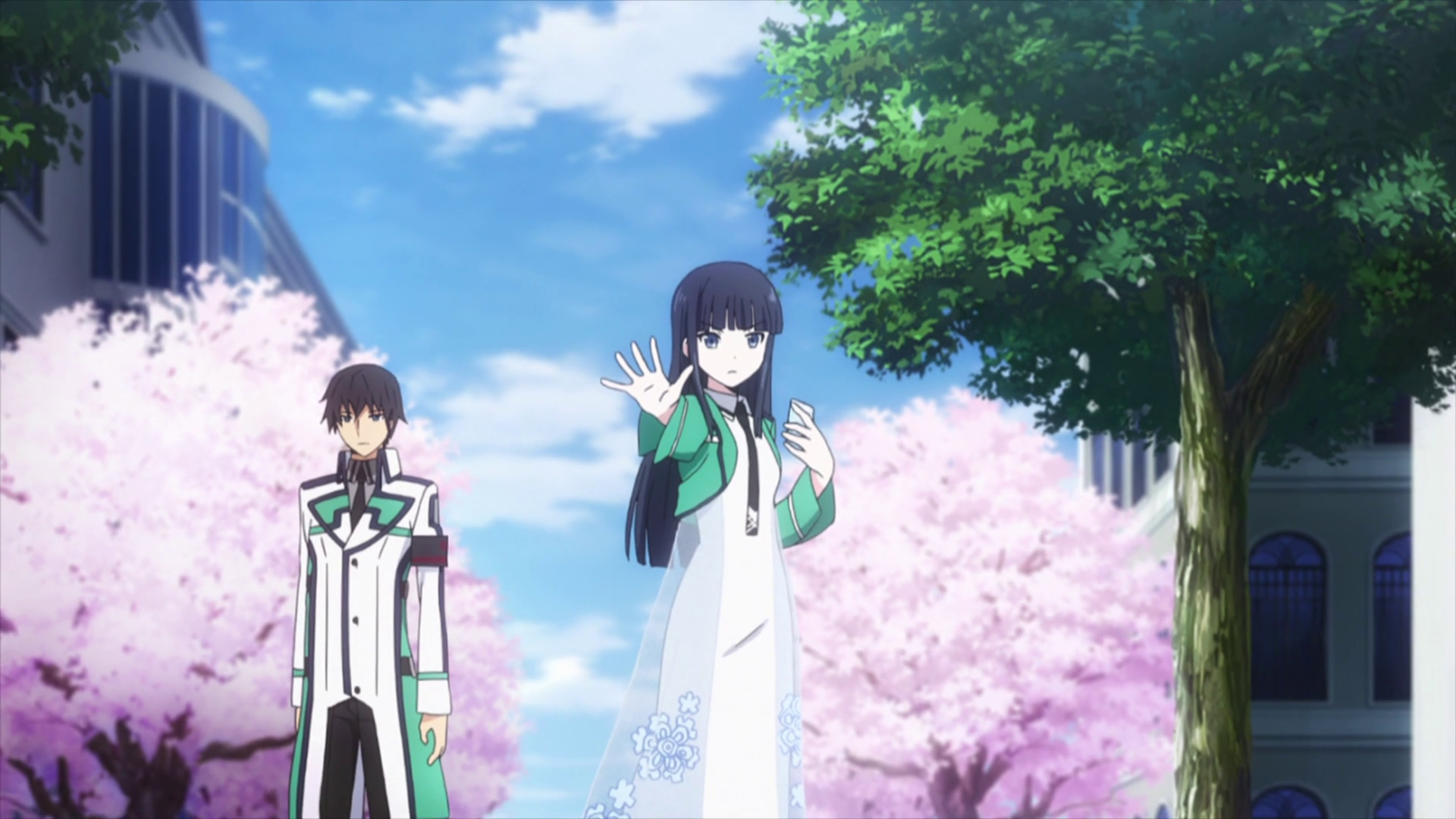
But now I have to move onto the negative of Mahouka… the leads. Tatsuya Shiba has bishounen looks out of Free! and none of the attitude of other popular shonen heroes like Naruto or Ichigo. In fact, he barely has much of an attitude at all. For a main character he is as cold as ice, incapable of cracking a smile or losing his composure. I’m sure there’s a plot reason for this, because Miyuki constantly feels indignity and offense for him. And yet somehow all of the characters around him are immediately attracted to him in some way. Maybe it’s because he looks like a leader, maybe it’s he’s so kakkoi (cool). This isn’t uncommon, but I do feel as if I get hit over the head with just how strong and genius and manly he is. But, this is shounen- every lead is the best in a shounen.
It doesn’t help that Miyuki is constantly crooning over her brother’s achievements and as a result seems like a less independent person on her own. Miyuki’s prodigious magical skill alone makes her an absolute badass, but her potential as a character is thrown away by her cries of “brother, brother” throughout the entire first arc. I understand familial love and sticking up for your own, and Tatsuya clearly cares about her, but the stark contrast between his love and the jealous, emotionally needy love of Miyuki rubs me the wrong way. It’s also awkward that Miyuki is used as an object for fanservice involving Tatsuya when they are blood siblings. Incest is denied vehemently, but when you see Miyuki turning tables into ice when Tatsuya talks about other girls and other questionable scenes, the whole thing becomes a bit of a mess. Maybe it’s just a running gag, all I know is that it compounded my dislike for the dynamic. This might change. I hope it does.
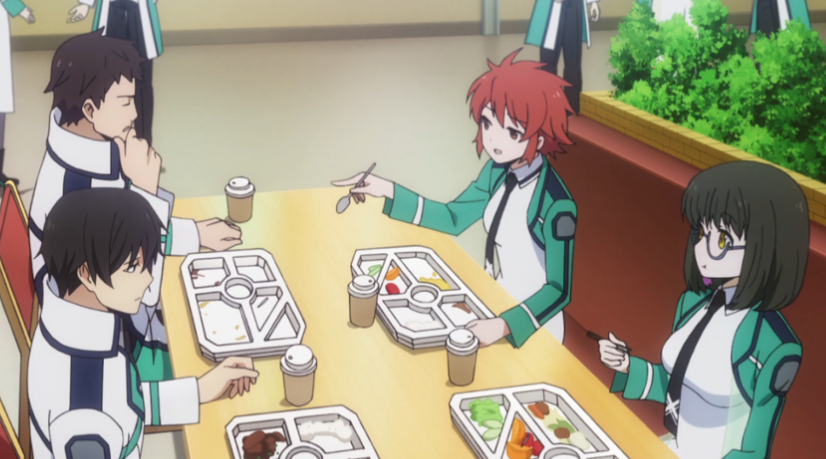
The side characters obviously don’t get as much screen time as the leads, so there is less known about them. In addition to the tomboyish redhead, Chiba Erika, the insightful nerd, Shibata Mizuki, and the lovable brute, Saijou Leonheart, there is also the pretty president, Saegusa Mayumi, and BAMF, Watanabe Mari. They are all designed distinctively and have separate voices to one another, and for the most part I liked the side characters better than Tatsuya and Miyuki. Their stories are more relatable, with a conclusion within reach, whilst the Shiba family remains a mystery to be slowly unraveled over the next 7 arcs. The driving character of Arc 1 is also very cool, but also a shining example of how Tatsuya is an emotionless knight in shining armour. Still, I liked them and their lines are usually funny. The elitist bunch just say the same thing over and over with different faces until Tatsuya inevitably kicks ass again. Predictable, but so is real prejudice.
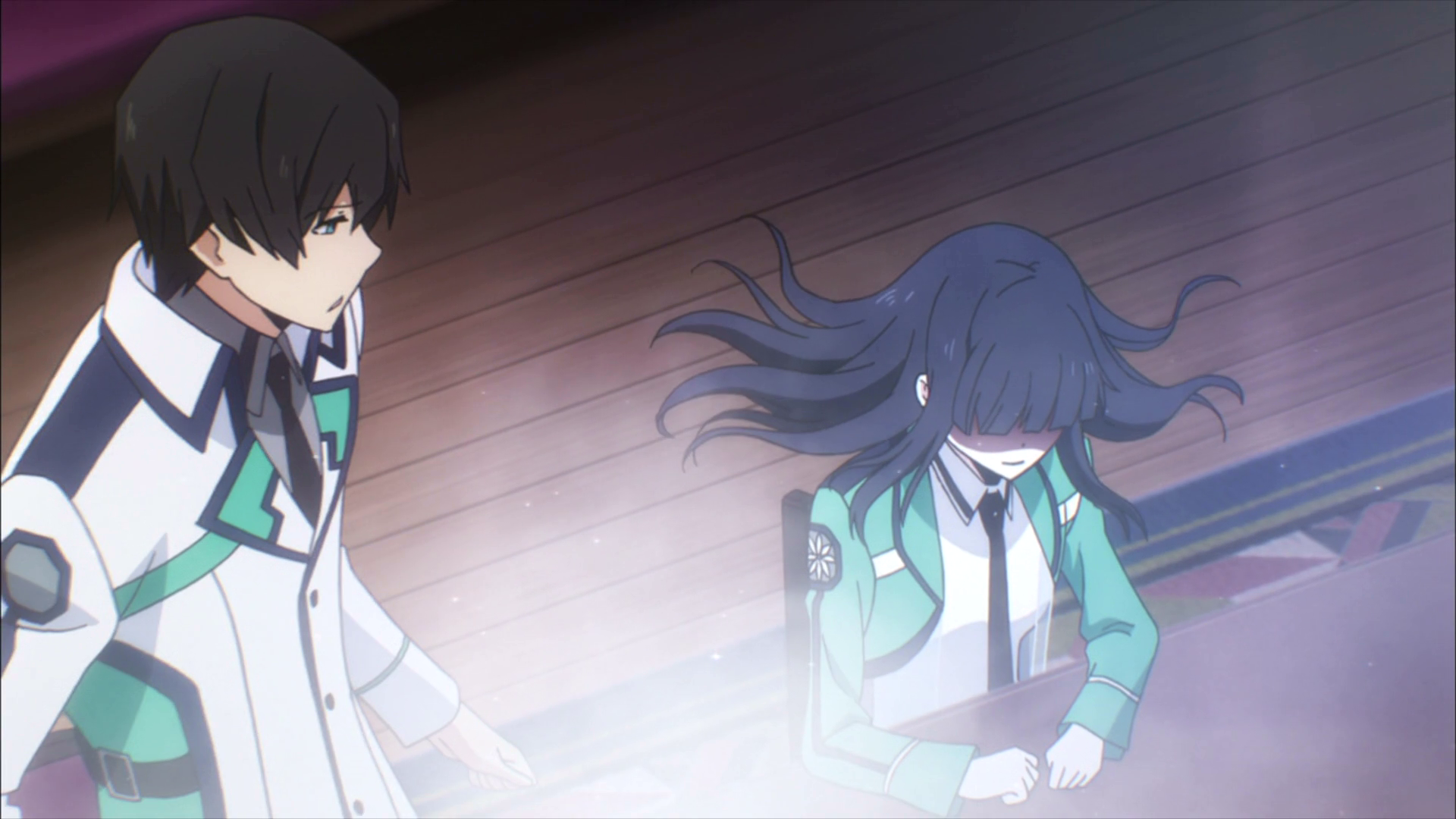
At its core, Mahouka is shounen that tries to work the genre in a different way and yet still bends under the weight of unnecessary genre tropes and hamfisted fanservice. The concept alone is interesting enough for me to continue watching it as it is released, but if I don’t see any dynamic change in the leads I’ll probably drop it. The Irregular at Magic High School is an entertaining and new contender in the anime market, however, the tiny nuggets of wisdom it contains are buried beneath cliches obviously designed to appeal to young teenaged boys. I understand this from a business standpoint, but shonen deserves more than cheap laughs at the expense of girls and gratuitous stripping because of its wide reach and impact on generations of kids. I mean, I still look back on Sailor Moon and Gundam Wing, here! I wish more shounen series could make their social commentaries without leaving them dangling on a string in favour of filler scenes.
As always, this review is merely an opinion, and those can always be debated and are subject to change, especially since this series is still airing.
Wow great review! I just started watching yesterday and I’m still on the 8th episode. This is a great overview for the next eps! Arigatou!